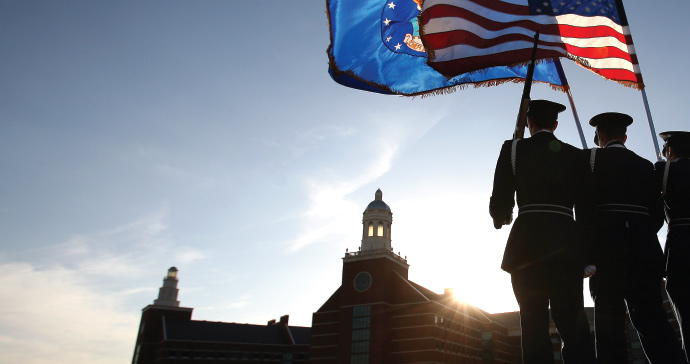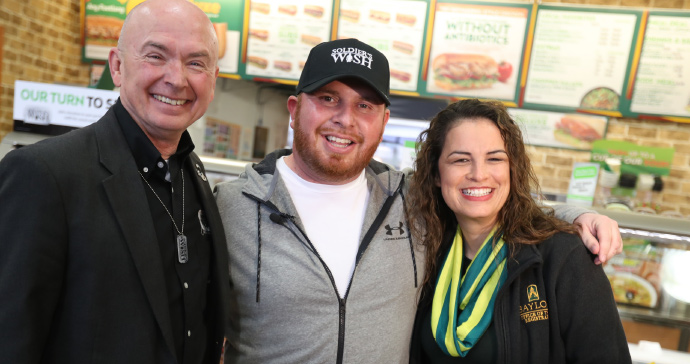Baylor VETS Program Aids Student Veterans in Transition

Jeannette Bonner’s day begins every morning at 4. Before lights are on in most of her neighbors’ homes, she prepares for a regimented day ahead. Soon, she is helping her three daughters get ready for school; once they’re off, she leaves base at Fort Hood and begins the hour-long drive to Baylor. After a full day of classes, she returns to Killeen, prepares dinner, shuttles her daughters to and from various school activities, studies, sleeps and does it all again the next day.
Bonner is a junior environmental health science major and a seven-year Army veteran. Her husband is an Army sergeant first class, and his deployments often place her in the role of both parents. Her daily routine is foreign to most of her Baylor classmates, but her fellow student veterans see her as one of many examples of the lengths to which they will go to attain their academic goals after years of serving their country.
“It’s a little different to be a student as a veteran,” Bonner said. “You hear classmates talking about parties and events, and you’re thinking about budgets and your children. Juggling everything is challenging. I don’t know what I’d do without the VETS program here. VETS really helped me find community here, and we all need that.”
Baylor’s Veterans Educational and Transition Services (VETS) program serves 85 student veterans, including Bonner. Since its founding in 2012, VETS has benefited hundreds of student veterans by providing resources that recognize and meet the unique needs student veterans share.
“We work to be proactive in fostering relationships, providing resources and helping create connections for our veterans,” VETS program manager and U.S. Marine veteran Kevin Davis, BA ’12, said. “To enter a higher education environment, it’s very different for a veteran. It doesn’t feel like what they’re used to. But our vets have so much to offer with their leadership experience and perspectives, and we work to encourage them to share that and excel in this new phase of life.”
Baylor was named a 2017 “Military Friendly School” by MilitaryFriendly.com, and the services VETS provide were the driving force behind the honor. VETS resources include a Veterans Transition Class, a Salutes to Sic ’ems mentor program that connects students with Baylor faculty and staff members who also served, academic support, a Veterans of Baylor student organization and more.
At the heart of each resource is relationship. Veterans gain a sense of empowerment and community in their new environment by connecting with other student veterans along with faculty and staff who share the perspective that comes from having served. Information and support are also VETS hallmarks. Navigating Baylor’s many departments can be challenging, especially when also dealing with family and work concerns. VETS provides personal assistance when veterans have questions and communicates regularly through email to share information about Baylor programs and opportunities.
“It means so much to have people here who have walked in your shoes,” Bonner said. “There’s always someone who says, ‘I can help you’ when I have a problem. It’s encouraging to know you’re not the only one feeling the same way and experiencing the same challenges. Sometimes, you just want to be able to talk about your experience with someone you know gets it. VETS provides me with that community, and I’m not sure I’d be here now without them.”
Bonner isn’t the only student veteran who credits VETS for providing the support to help them stay on campus. Nick Harrington, a sophomore communication sciences and disorders major, feels the same way.
Harrington received the diagnosis of thyroid cancer after applying to Baylor in the summer and before classes began in the fall. He has since had two surgeries, and he frequently travels to Houston for continued treatments and checkups at M.D. Anderson Cancer Center. He felt certain his dream of continuing his education would be derailed. However, Harrington found a VETS team firmly in his corner and willing to help.
“I emailed them and told them I didn’t think I would be able to begin school in the fall,” Harrington said. “They told me that they would be here for me to help.”
He said Davis and Dr. Janet Bagby, an educational psychology senior lecturer who founded the VETS program in 2012, were in constant contact.
“It was important for me to know that I’d have a support system of people who were there for me,” Harrington, who continues his bout with cancer, said. “It really eased a lot of the anxiety I had about coming to school in my condition.”
In another show of support, Mark Ochsenbein from Soldier’s Wish, a non-profit corporation dedicated to making a difference in the lives of veterans and their families, surprised Harrington with $5,000 to help alleviate some of his extra expenses. Veterans Coordinator Jessica Alford had nominated Harrington without his knowledge.
Harrington, who served six years in the Army, is no stranger to adversity.
In 2005, he was in a Humvee in Iraq when a roadside bomb exploded, causing major injuries to all involved. Harrington suffered a separated shoulder that severed his ulnar nerve, hindering the function of his hand, and a torn ACL and PCL in the blast. Following multiple surgeries and years of physical therapy, he found himself unsure of what to do without the familiarity of military life. The cancer diagnosis could have been a crippling blow. Instead, he says VETS’ encouragement is the reason he’s found the community he desperately needed.
“Being here at Baylor is really pretty much what is keeping me going,” Harrington said. “I couldn’t ask for a better place to be than Baylor during something like this, and VETS gave me the encouragement I needed to take this step. VETS is really a hidden gem here. For people like myself who have benefitted greatly from the program, it’s everything. Because, honestly, if they hadn’t reached out to me, I wouldn’t be here at Baylor right now.”
Baylor’s VETS program exists to serve the men and women who served our country. As the program grows, VETS is expanding services to include resources that connect and support veterans’ families, help with the cost of textbooks and more. A gift to the VETS Program Fund can make a difference for veteran students and their families.
Learn more at baylor.edu/vets or consider a gift at bbis.baylor.edu/give.
